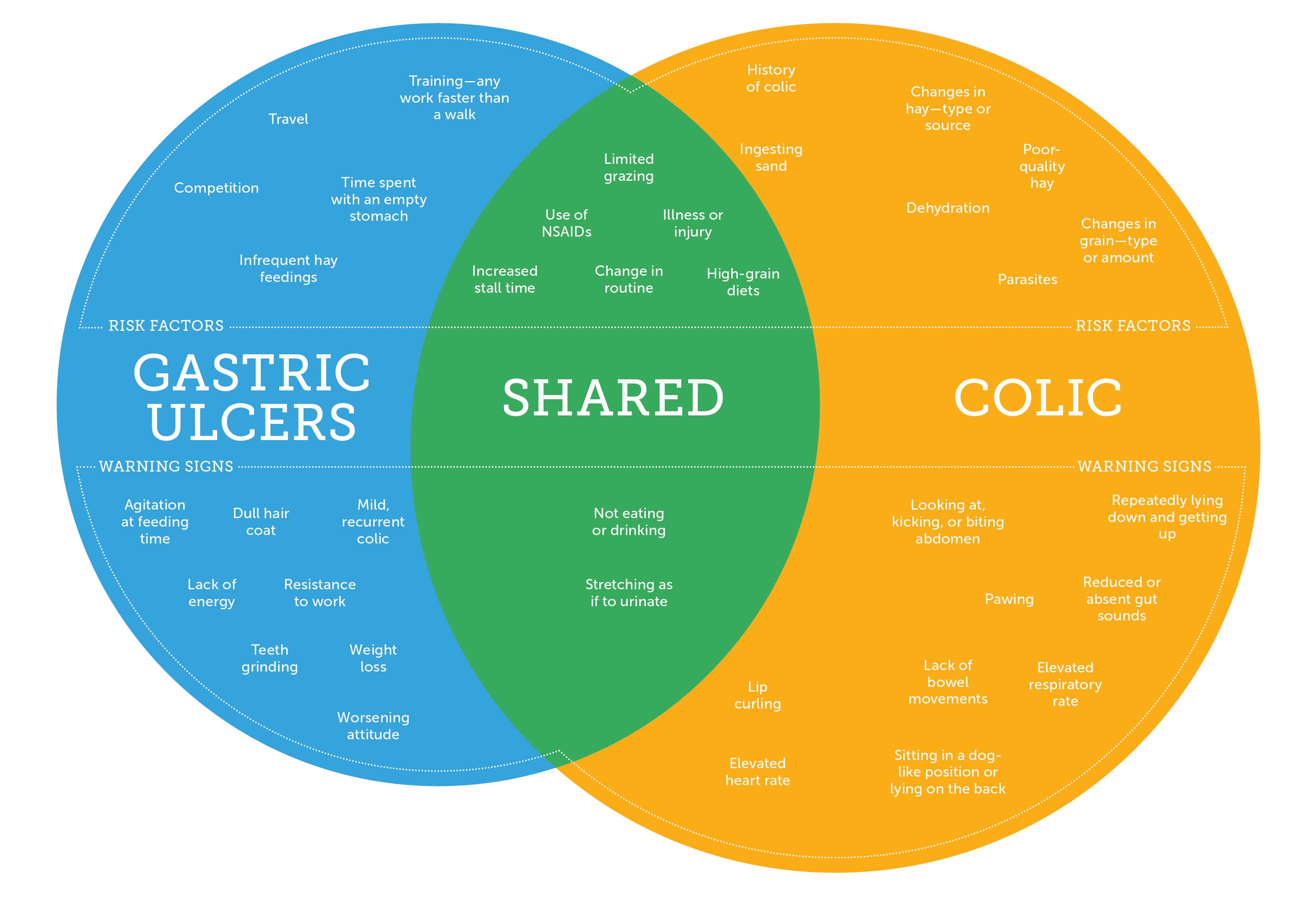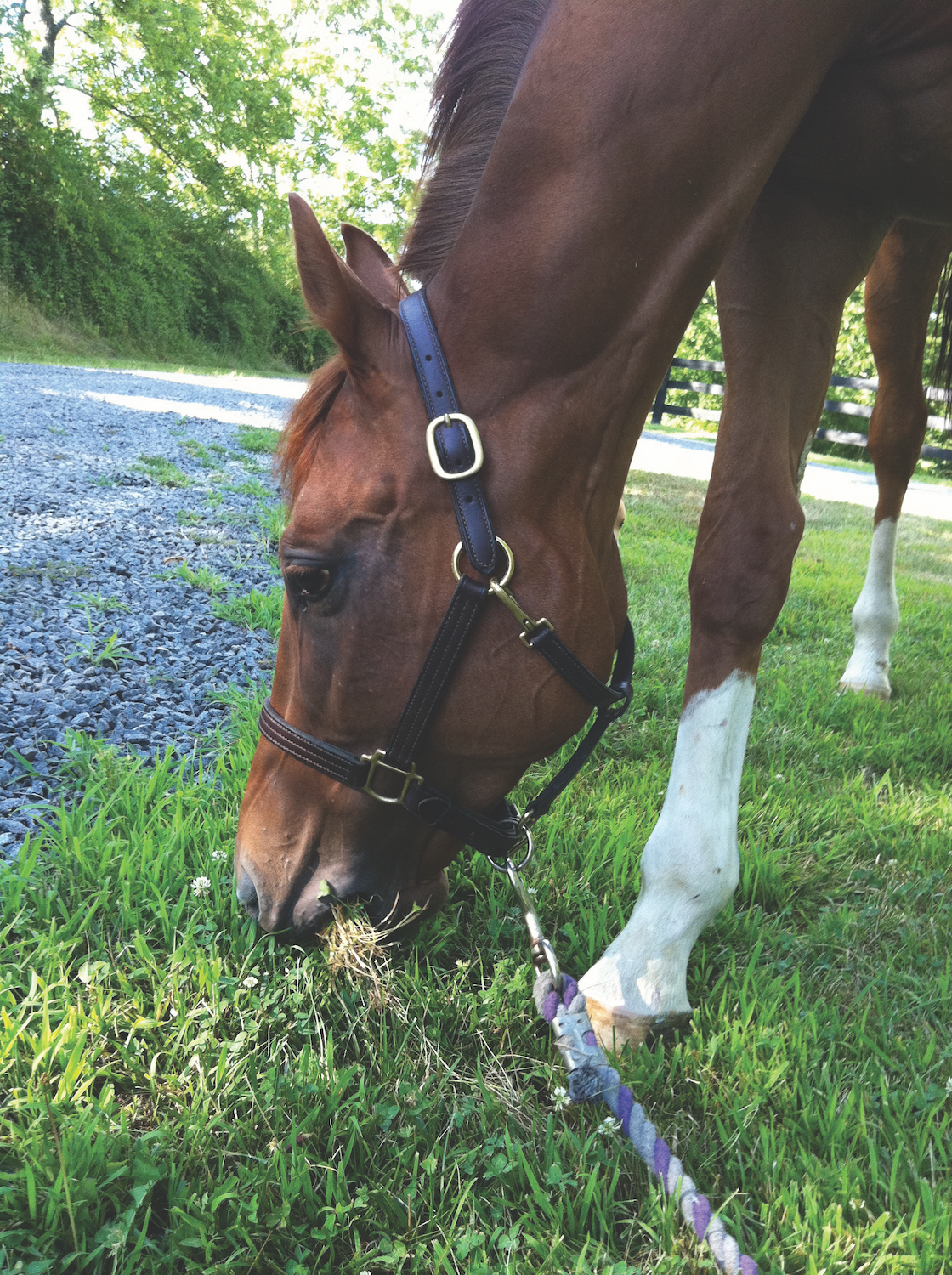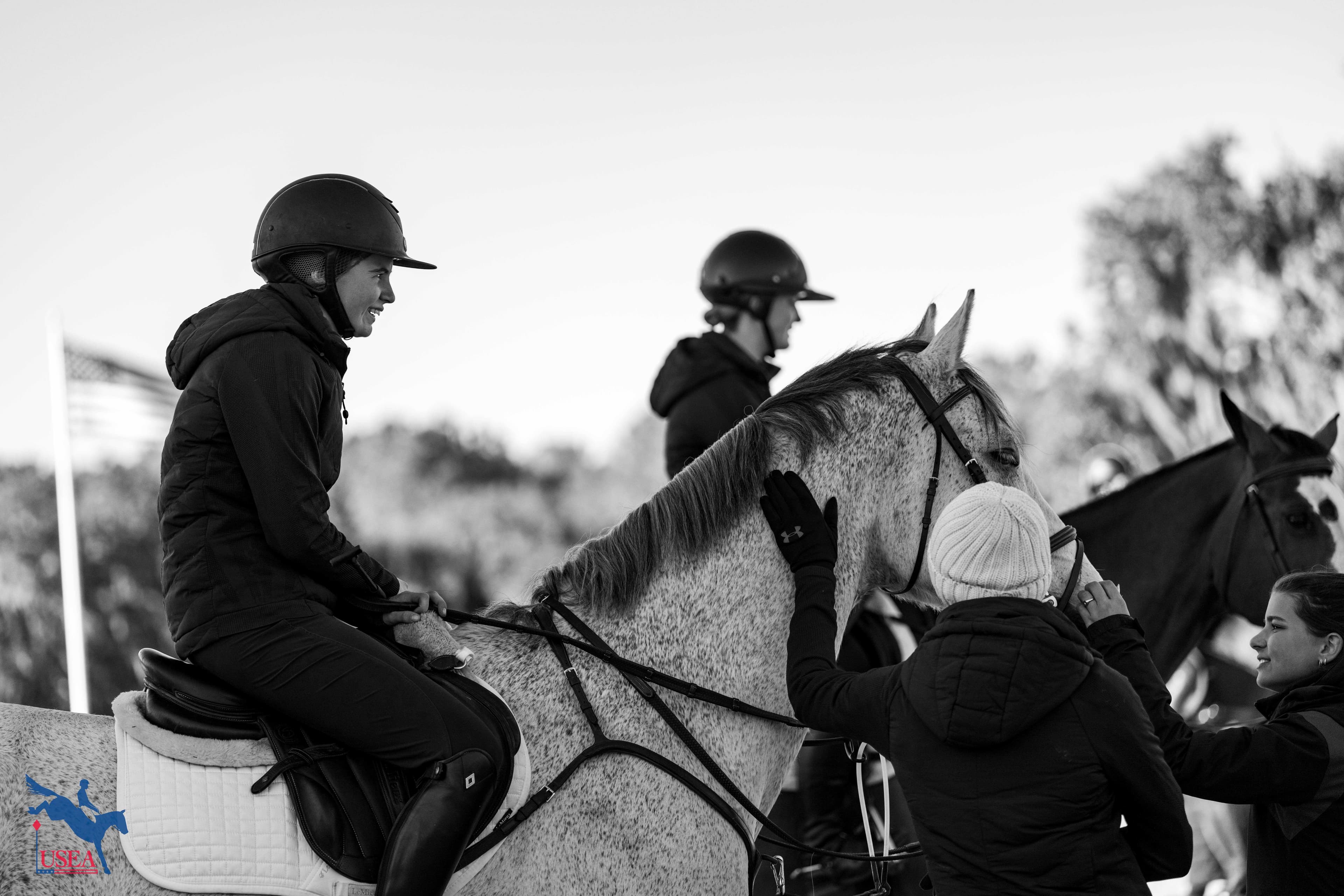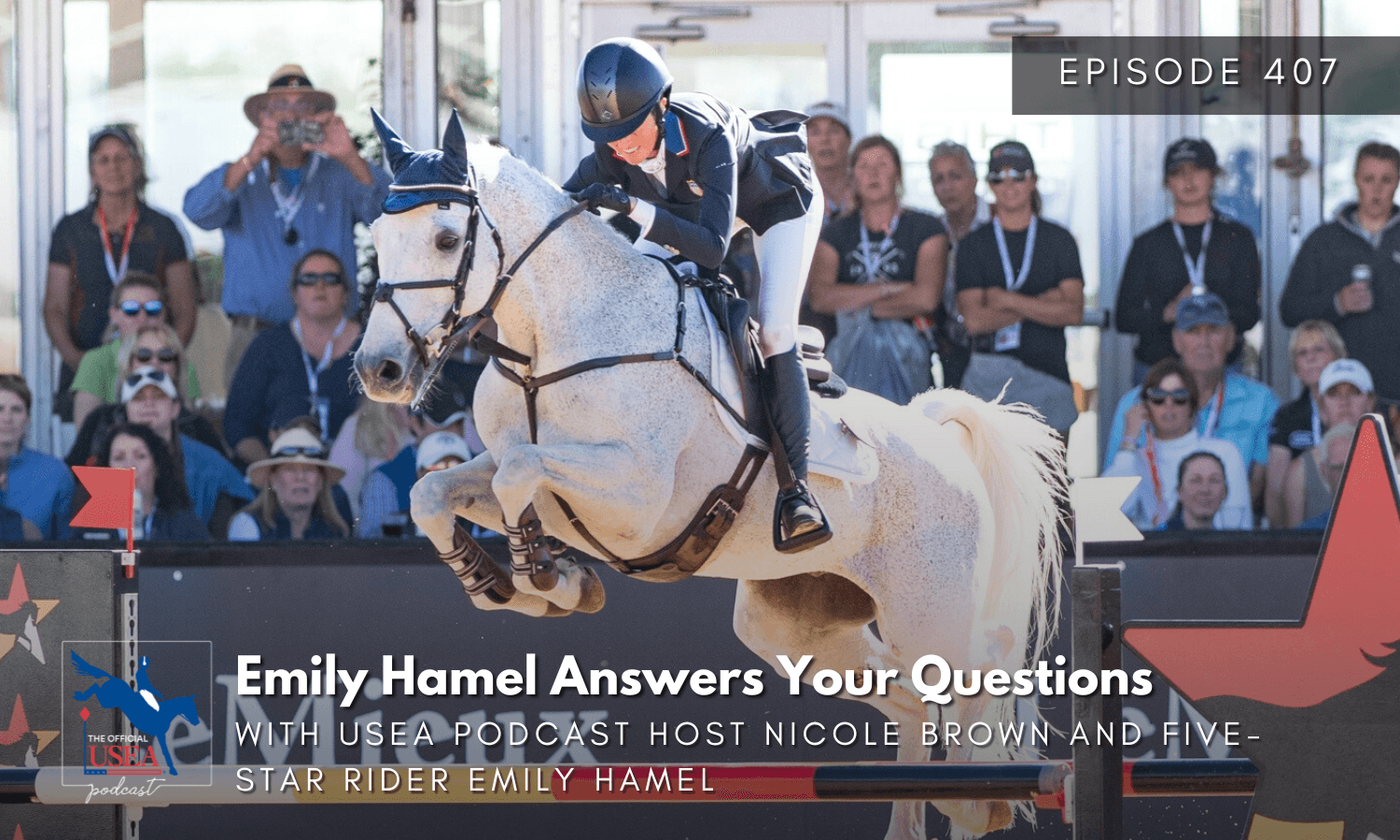Foregut or Hindgut? That's The Question!

This article originally appeared in the July/August 2016 issue of Eventing USA magazine. The Horse Health column is sponsored by SmartPak, the Official Supplement Feeding System of the USEA.
Knowing what sort of support your horse needs can be tough, but it can also make a big difference.
There’s a lot of confusion between your horse’s foregut health and hindgut health. After all, the process of breaking down food and absorbing nutrients is all technically “digestion,” so isn’t it all the same? Not quite. The organs in the foregut and hindgut have different functions, and each area has unique health concerns. An unhealthy stomach is at risk for gastric ulcers, while an unhealthy hindgut is at risk for colic and other digestive upset.
As if all that’s not complicated enough, colic is not only the primary problem in the hindgut, it’s also a general term for abdominal pain, which means mild, recurrent colic can also be a sign of gastric ulcers. However, for the purposes of this article, when we say “colic,” we’re referring to problems (gas, impaction, twists, etc.) in the organs that make up the hindgut.
Confused? Have no fear – we’ll look at each condition in greater detail, and identify ways you can help support your horse.
Gastric Ulcers
Can one small organ really make such a big difference in your horse’s health? Turns out, it can! Luckily, there are smart ways you can provide your horse with the ultimate gastric health support.
The word “gastric” means “of or pertaining to the stomach,” so gastric health focuses entirely on one organ – the stomach. While your horse’s stomach is relatively small, accounting for less than 10 percent of his total digestive capacity, it can cause some pretty big problems, including gastric ulcers.
Over 60 percent of performance horses suffer from gastric ulcers, a painful condition that can cause decreased performance, weight loss, and more. Luckily, there are ways you can treat and prevent ulcers and maintain overall gastric health.

Your horse’s body was designed for constant grazing (about 10-17 hours per day), which means the stomach is almost never empty. However, modern horsekeeping makes that tough to achieve. Often, a horse’s diet is composed of infrequent meals of hay and grain, with most of the day spent with an empty stomach. This leaves your horse’s sensitive stomach lining exposed to harsh gastric acids, which can cause gastric ulcers. Add to the mix that stress from training, travel, competition, and more can also contribute to ulcers, and you’ve got a recipe for an unhappy stomach.
The only way to accurately diagnose an ulcer is with an endoscopic exam performed by your veterinarian.
Ulcer Warning Signs
- Reluctance to eat or drink
- Worsening attitude
- Less-than-optimal performance
- Dull hair coat
- Weight loss
- Agitation at feeding time
- Mild, recurrent abdominal pain
How Can I Help My Horse?
If your horse has been diagnosed with gastric ulcers, you should work with your veterinarian to develop a treatment plan, which may include FDA-approved prescription medication.
The risk factors for occasional gastric upset include training, traveling, competing, or infrequent hay feedings. If your horse is exposed to any of these factors, a combination of daily support from a supplement and smart management can help ensure he has what he needs for a healthy stomach. Look for supplements that provide ingredients like calcium and magnesium to help neutralize gastric acid, as well as glutamine, glycine, and soothing herbs to support healthy stomach lining.
When building your horse’s gastric maintenance plan, you also want to consider his diet and other management strategies. When it comes to your horse’s diet, focus on hay and other forage, ideally allowing your horse pasture grazing or free-choice access to hay 24/7. Because large grain meals have been identified as a risk factor for gastric upset, add only the minimum amount of grain (if any) your horse needs to maintain weight and performance.
Other management tips to consider include increasing turnout time, limiting the use of NSAIDs (such as Bute), and making any changes to his routine or workload as gradually as possible.
Now that we’ve covered “gastro,” let’s move on to the “intestinal” part of the gastrointestinal tract.
Colic and Digestive Upset
Now that we’ve covered the stomach, what’s next? Technically, the small intestine is the next organ in your horse’s GI tract, as it is the second portion of the foregut. However, since this article focuses on the two main “problem” areas, we’re going to move on to the hindgut – what it does, what can go wrong, and how you can help keep your horse healthy.
In horses, the term “hindgut” refers to the section of the GI tract containing the cecum, large colon, small colon, and rectum. The hindgut is responsible for digesting the complex or structural carbohydrates your horse eats, including all of his forage (hay, pasture, etc.). Since the majority of your horse’s diet should be made up of forage, there’s obviously a lot of work to be done!
If your horse’s hindgut isn’t functioning properly, it can cause a variety of problems. Excess gas, impaction, and loose stool can all result from hindgut upset or malfunction. Even more concerning, digestive upset can lead to colic, which can be fatal. Colic is a general, catchall term used to refer to any sort of abdominal pain in horses (in layman’s terms, it’s a bellyache). While some cases may be so mild that you don’t even notice, a severe case of colic is a medical emergency that may require surgery, and in some cases can be fatal.
Unfortunately, research has shown that many day-to-day barn events are proven to increase a horse’s risk of colic. Changes in hay, including switching types or feeding a new cut, can increase your horse’s chances of developing colic by 10 times. In addition, changing grain (type or amount) can increase a horse’s colic risk up to five times.
Other proven risk factors include large amounts of grain, a change in activity level, lack of access to water, increased stall time, and parasites.
How Can I Help My Horse?
While nothing can prevent occasional digestive upset, working with your veterinarian to ensure your horse is being managed and fed appropriately may reduce his risk level. One approach your vet may recommend is daily support from a supplement to help your horse cope with digestive stress.
When choosing a digestive supplement for your horse, look for a formula that provides comprehensive support for a healthy, balanced hindgut. Perhaps the most common ingredient horse owners look for is probiotics, which are live microorganisms that play a key role in the digestive process. Other ingredients for hindgut health include:
- Prebiotics, shown to reduce disruption in the hindgut
- Yeast demonstrated to improve fiber digestion and assist in adjusting to feed changes
- Enzymes, shown to increase proper digestion of starch in the foregut
It’s also important to work closely with your veterinarian to develop a wellness program that supports optimal health. This may include a physical examination each year, a review of your parasite control program, a dental examination with follow-up care, and possibly other measures.
Did you enjoy this article? Want to receive Eventing USA straight to your mailbox? Members receive Eventing USA as part of their USEA Membership or you can purchase individual issues from the USEA Shop.














